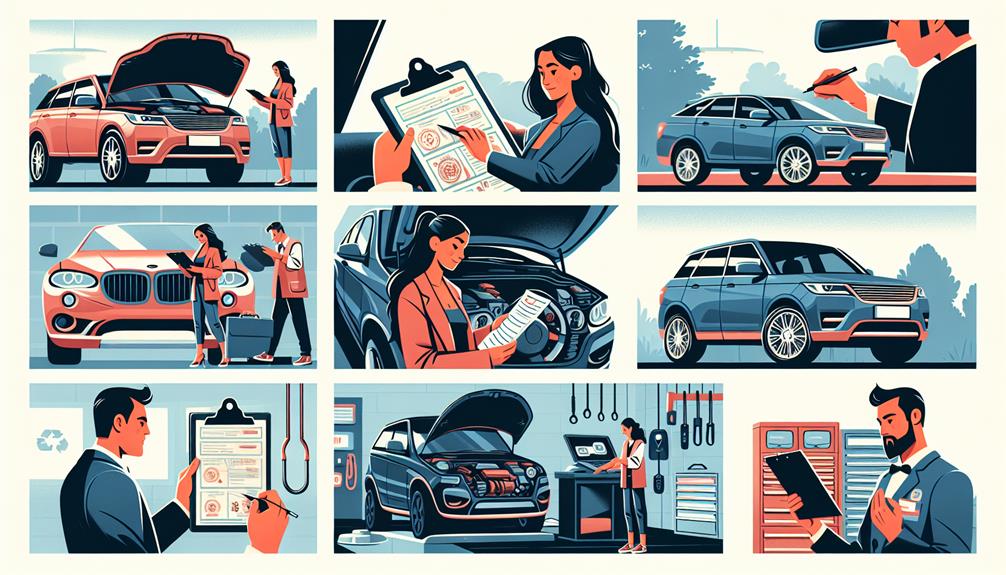
Before buying a car, it is essential to meticulously evaluate several key aspects to avoid costly surprises in the future. First, review the vehicle history report to uncover any potential past problems. Next, evaluate the market value to make sure you're getting a fair deal. Carry out a pre-purchase inspection including exterior checks, test drives and potentially hiring a mechanic to identify hidden problems. Also, consider the ownership costs beyond the purchase price, such as insurance and maintenance. Finally, approach negotiations strategically, carefully evaluating the financing options and the terms of the contract. By following these steps, you will be well equipped to make an informed purchase.
Contents
Before finalizing the purchase of a used car, it is vital that you thoroughly review the vehicle history report to confirm that you are aware of any potential problems in the car's past.
This detailed document provides essential information on the accident history of the car, title problemsIt is also important to note the importance of previous ownership and any significant events that may impact its safety and performance.
Check specifically for terms such as 'salvaged' or 'flood damaged', which can indicate significant problems in the past.
Checking the mileage is also important to ensure that the odometer reading is accurate.
If you are buying from a private seller, ask them to provide the report or buy it yourself for full transparency.
Use services such as Carfax or AutoCheck to get a detailed overview of the vehicle's history.
With a complete understanding of vehicle historyyou can shift your focus to acquiring the best possible deal by precisely determining the market value of the car and guaranteeing the right financing conditions for your purchase.
Assessing market value involves researching the fair price of the desired vehicle using reliable resources such as the Kelley Blue Book. This will ensure that you don't overpay for your new or used vehicle.
In addition, understanding their financing options beforehand can help you avoid financing through the dealership with inflated interest rates. Try to keep your car payments within 10-15% of your net income to ensure that total car expenses remain within 20% of your income, thus ensuring long-term financial stability.
During the pre-purchase inspectionIn order to ensure that the vehicle is in good condition, you should methodically examine its condition, starting with the exterior to discover any external damage before proceeding to the engine compartment and underneath the car.
Check the body panels for scratches and dents, making sure all the lights and mirrors are functional. Inspect the engine oil and coolant levelslooking for signs of leaks.
One driving test will help you evaluate the car's performance, comfort and responsiveness to your driving preferences. Monitor the dashboard warning lights and listen for unusual noises during acceleration and braking to identify potential problems.
Consider hiring a mechanic for a diagnostic check that could reveal hidden problems.
This thorough approach ensures that you are well informed about the car's condition and safety features during the purchase process.
When comparing different cars, you should analyze the total cost of ownershipwhich includes monthly payments, insurance premiumsThis will help you assess the long-term costs of ownership, fuel, maintenance and other expenses to confirm that they fit into your budget without exceeding 20% of your net income. This will help you assess the long-term costs of ownership and make an informed decision.
Researching insurance quotes for various vehicle models is also essential, as rates can vary considerably depending on the make and model.
Consider the fuel efficiency, the maintenance needs and cargo space of each car to see if they meet your lifestyle needs.
Prioritize important features, such as security technology and connectivity options to ensure a comfortable driving experience.
Negotiating the Purchase and the Paperwork
To negotiate the price of your new vehicle, establish the rules of the game early on and separate discussions about the price of the vehicle from those about financing or trade-ins. This keeps your negotiation process clear and avoids manipulation on the part of the seller.
Start with yours low pre-calculated offer based on the average transaction price for the model and level of equipment you want. State your researched offer with confidence and be prepared to explain how you arrived at that figure. If the seller manages to meet your target, you're ready to sign immediately.
Before closing the deal, review the contract carefully to ensure that all agreed terms are accurately reflected. This includes the duration of the loan, interest rates and any other financing conditions.
Refuse unnecessary extras such as extended warranties that can inflate the total cost. Keep vehicle history reports and inspection records organized for future reference and resale value.
Before you start your car, check these key elements: engine performance, ensuring proper tire pressure, fluid levels, battery condition and brake functionality. Don't forget the dashboard indicators, windshield wiper operation, exhaust system integrity and critical safety features.
Before buying a car, carefully check the vehicle's history, test drive it, review maintenance records and assess the engine's condition, fuel efficiency and resale value to ensure a well-informed purchase decision.
What are you willing to sacrifice for a great deal on a used car? Don't sacrifice safety and security. Research the vehicle's history and performance records, do a thorough test drive and negotiate the price intelligently, taking into account maintenance records and warranty options. This way, you can strike a balance between affordability and reliability.'
Before buying a used car, you should inspect the engine's performance and fuel efficiency, as well as checking the safety features.